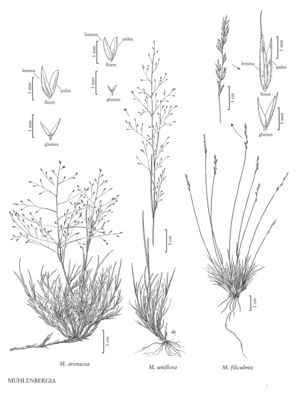Difference between revisions of "Muhlenbergia arenacea"
FNA>Volume Importer |
imported>Volume Importer |
||
| (8 intermediate revisions by 2 users not shown) | |||
| Line 17: | Line 17: | ||
-->{{Treatment/Body | -->{{Treatment/Body | ||
|distribution=Ariz.;Colo.;N.Mex.;Tex. | |distribution=Ariz.;Colo.;N.Mex.;Tex. | ||
| − | |discussion=<p>Muhlenbergia arenacea grows in sandy flats, plains, alluvial fans, washes, depressions, and alkaline mesas in open grasslands, at elevations of 1000-2200 m. Its range extends from the southwestern United States into northern Mexico.</p> | + | |discussion=<p><i>Muhlenbergia arenacea</i> grows in sandy flats, plains, alluvial fans, washes, depressions, and alkaline mesas in open grasslands, at elevations of 1000-2200 m. Its range extends from the southwestern United States into northern Mexico.</p> |
|tables= | |tables= | ||
|references= | |references= | ||
| Line 26: | Line 26: | ||
-->{{#Taxon: | -->{{#Taxon: | ||
name=Muhlenbergia arenacea | name=Muhlenbergia arenacea | ||
| − | |||
|authority=(Buckley) Hitchc. | |authority=(Buckley) Hitchc. | ||
|rank=species | |rank=species | ||
| Line 33: | Line 32: | ||
|basionyms= | |basionyms= | ||
|family=Poaceae | |family=Poaceae | ||
| + | |illustrator=Linda A. Vorobik;Annaliese Miller | ||
| + | |illustration copyright=Utah State University | ||
|distribution=Ariz.;Colo.;N.Mex.;Tex. | |distribution=Ariz.;Colo.;N.Mex.;Tex. | ||
|reference=None | |reference=None | ||
| Line 38: | Line 39: | ||
|publication year= | |publication year= | ||
|special status= | |special status= | ||
| − | |source xml=https:// | + | |source xml=https://bitbucket.org/aafc-mbb/fna-data-curation/src/200273ad09963decb8fc72550212de541d86569d/coarse_grained_fna_xml/V25/V25_754.xml |
|subfamily=Poaceae subfam. Chloridoideae | |subfamily=Poaceae subfam. Chloridoideae | ||
|tribe=Poaceae tribe Cynodonteae | |tribe=Poaceae tribe Cynodonteae | ||
Latest revision as of 17:58, 11 May 2021
Plants perennial; rhizomatous, not cespitose. Culms 10-30(40) cm, decumbent, terete to some¬what compressed-keeled near the base; internodes scabridulous below the nodes. Sheaths about 1/2 as long as the internodes, margins hyaline; ligules 0.5-2 mm, hyaline, with lateral, 1-2 mm lobes; blades 0.7-4(6) cm long, 0.5-1.7 mm wide, flat, occasionally folded, tapering, scabrous abaxially, strigulose adaxially, margins and midveins thickened, whitish, apices narrow, often sharp. Panicles 5-15 cm long, 4-14 cm wide, broadly ovoid, open; primary branches 2-8 cm, capillary, straight to slightly flexuous, diverging 45-80(100)° from the rachises, never appearing fascicled, naked proximally; pedicels 1-11 mm, usually longer than the spikelets. Spikelets 1.5-2.6 mm, occasionally with 2 florets. Glumes equal, 0.9-2 mm, 1-veined, usually acute to acuminate, occasionally erose and mucronate, mucros to 0.2 mm; lemmas 1.5-2.5 mm, lanceolate to oblong-elliptic, plumbeous to purplish, sparsely appressed-pubescent on the lower 1/2 of the margins and midveins, hairs to 0.3 mm, apices acute to obtuse, sometimes shallowly bilobed, mucronate, mucros to 0.3 mm; paleas 1.5-2.6 mm, lanceolate, glabrous, obtuse to acute; anthers 1-1.5 mm, yellowish to purplish. Caryopses 1-1.3 mm, elliptic, brownish. 2n = unknown.
Distribution
Ariz., Colo., N.Mex., Tex.
Discussion
Muhlenbergia arenacea grows in sandy flats, plains, alluvial fans, washes, depressions, and alkaline mesas in open grasslands, at elevations of 1000-2200 m. Its range extends from the southwestern United States into northern Mexico.
Selected References
None.
